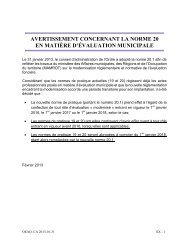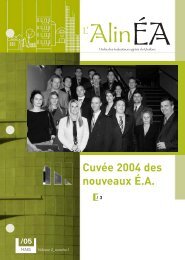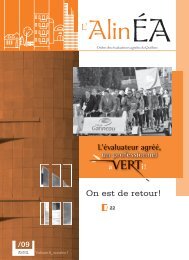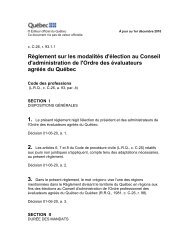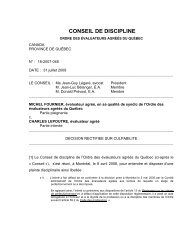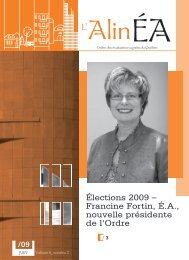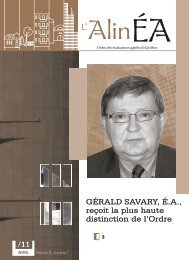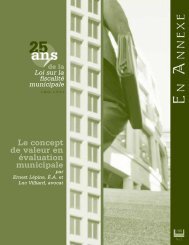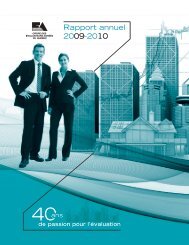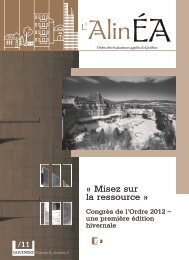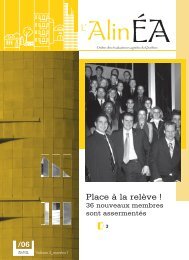RSQ, c. C-26, s. 87 - Ordre des évaluateurs agréés du Québec
RSQ, c. C-26, s. 87 - Ordre des évaluateurs agréés du Québec
RSQ, c. C-26, s. 87 - Ordre des évaluateurs agréés du Québec
Create successful ePaper yourself
Turn your PDF publications into a flip-book with our unique Google optimized e-Paper software.
CODE OF ETHICS OF THE MEMBERS OFTHE ORDRE DES ÉVALUATEURS AGRÉÉS DU QUÉBECProfessional Code(R.S.Q., c. C-<strong>26</strong>, s. <strong>87</strong>)CHAPTER 1GENERAL1. This Code determines, pursuant to section <strong>87</strong> of the Professional Code (R.S.Q.,c. C-<strong>26</strong>), the <strong>du</strong>ties incumbent upon all members of the <strong>Ordre</strong> <strong>des</strong> <strong>évaluateurs</strong><strong>agréés</strong> <strong>du</strong> <strong>Québec</strong> who engage in professional activities.In particular, it determines the acts that are derogatory to the dignity of theprofession, sets out provisions to preserve the secrecy of confidentialinformation that becomes known to an appraiser in the practice of hisprofession, and establishes the conditions and proce<strong>du</strong>re applicable to theexercise of the rights of access and correction provided for in sections 60.5 and60.6 of the Professional Code as well as conditions, obligations, andprohibitions in respect of advertising by an appraiser.CHAPTER IIDUTIES TOWARD CLIENTS, THE PROFESSION, AND THE PUBLICDivision I – Competence and integrity2. Every appraiser must discharge his professional obligations with competenceand integrity.The appraiser must provide high-quality professional services.3. An appraiser must maintain and increase his knowledge and skills andconstantly seek to improve his professional outlook.4 An appraiser must practice his profession in keeping with good practice andgenerally accepted standards.
5. An appraiser must consider the limitations of his skills, knowledge, experience,and the means at his disposal. In particular, no appraiser shall undertake orcontinue an appraisal for which he is insufficiently qualified, without obtainingthe necessary assistance.6. In addition to the provision of section 54 of the Professional Code, no appraisershall practise his profession or perform professional acts under conditions or insituations likely to impair the dignity of the profession or the quality of theservices he provi<strong>des</strong>.7. An appraiser must consider the general effect that his research and work couldhave on society.8. An appraiser must promote all measures likely to improve the availability andquality of professional services in his field of practice.The appraiser must, among other things, promote all training or information<strong>des</strong>igned to make such services known to the public and, at the request of theOrder, participate in the implementation of such measures, unless he hasserious cause not to do so.Division II - Con<strong>du</strong>ct9. An appraiser's con<strong>du</strong>ct must be irreproachable.The appraiser shall, in particular, act with courtesy, dignity, moderation, andobjectivity.10. Every appraiser shall avoid attitu<strong>des</strong> and methods likely to diminish the goodrepute of the profession or his ability to serve the public interest. He shall avoiddiscriminatory, frau<strong>du</strong>lent, or illegal practices, and must refuse to participate insuch practices.
11. Every appraiser shall show respect toward all commissions of inquiry, bodies,and courts, and the members thereof.No appraiser shall, directly or indirectly, broadcast or publish comments orremarks that he knows to be false or that are manifestly false, concerning acommission of inquiry, a body, or a court, or any member thereof.12. No appraiser shall, directly or indirectly, comment publicly in any mannerwhatsoever on any case that is pending before a commission of inquiry, a body,or a court, and in which he or one of his partners or employees has acted.13. No appraiser shall(a)(b)lead or attempt to lead a court into error, create doubt in favour of aclient, or restrict or deform reality by his testimony;prevent or try to prevent another party from being assisted by anappraiser or represented by an advocate.Division III - Impartiality and independence14. An appraiser must subordinate his personal interests to those of his client.For the purposes of this Regulation, the word "client" means the personrequiring the services of the appraiser.15. No appraiser shall agree to render professional services where he knows that acontract for the same services has already been concluded with anotherappraiser, unless he advises his client of a possible <strong>du</strong>plication of costs andservices.16. No appraiser shall refuse to render professional services without reasonablecause.However, no appraiser shall accept more contracts than are dictated by theinterests of his clients and the respect of his professional obligations.17. Every appraiser shall safeguard his professional independence at all times. Heshall, in particular,
(1) ignore any intervention by a third party that could influence the fulfilmentof his professional obligations to the detriment of his clientele;(2) retain his professional independence when called upon to collaboratewith another person, notably, another member of the Order or a memberof another professional order;(3) avoid performing a task contrary to his professional conscience, to therules of his profession, or to generally accepted standards of practice;(4) avoid appraising, examining, or holding a consultation on a thing or aright in which he or his partners have an interest, whether direct orindirect, present or future;(5) refrain from sitting as a member of an adjudicatory body in a decision orrecommendation relating to the rights and obligations of his client or theclient of a partner;(6) refrain from acting in a situation where he could derive personaladvantage, whether direct or indirect, present or future.18. An appraiser who, without compromising his professional independence, acts fora client both as an appraiser and in another capacity or solely in anothercapacity, must disclose this fact and the manner in which he is remunerated, tothe client in writing, and explain how his independence is maintained.An appraiser who acts solely in another capacity must also obtain his client’sagreement that no act will be deamed a considered opinion of value.The appraiser’s disclosure and the client’s agreement do not exempt theappraiser from his obligation to maintain professional independence at all timesand to cease to act where the situation becomes irreconcilable with his <strong>du</strong>ty toremain independent.19. Every appraiser shall avoid any situation in which he could be in a conflict ofinterest. Without restricting the generality of the foregoing, the appraiser is in aconflict of interest(1) where he serves opposing interests, notably, where he agrees with athird party to appraise an immovable situated in the territory of amunicipality for which he prepares and maintains the municipal roll;(2) where the interests in question are such that he might favour some of
them over those of his client or where his judgment and loyalty towardhis client could be unfavourably affected.As soon as he becomes aware that he is in a situation of conflict of interest, orapparent conflict of interest, the appraiser must disclose this fact in writing tothe clients concerned and request authorization to continue to act for them.Mention of this must be made by the appraiser in his report.20. Generally, an appraiser shall act for only one party in any given case.Where an appraiser's professional <strong>du</strong>ties require him to act for more than oneparty, such as in the capacity of arbitrator or amiable compositeur, he mustspecify the nature of his <strong>du</strong>ties or responsibilities to all parties concerned andinform them that he will cease to act if the situation becomes irreconcilable withhis <strong>du</strong>ty to remain independent.21. Every appraiser shall refuse any benefit, commission, or return relative to thepractice of his profession that is in addition to the remuneration to which he isentitled. Similarly, no appraiser shall pay, offer to pay, or undertake to pay suchbenefit, commission, or return.Division IV - Diligence and availability22. An appraiser shall display reasonable availability and diligence. He shall,among other things, inform his client upon request of the approximate timerequired for the execution of the professional service.Division V - Fees23. Every appraiser must charge fair and reasonable fees.Fees are considered fair and reasonable if they are warranted under thecircumstances and in proportion to the services provided.24. In determining the amount of his fees, an appraiser shall consider the followingfactors in particular:(1) the knowledge or skill required to perform the professional services;
(2) the degree of responsibility assumed;(3) the degree of difficulty and the importance of the professional services;(4) his experience;(5) the performance of professional services that are unusual or that requireexceptional speed or competence;(6) the tariff suggested by the Order for the professional services rendered;(7) the time required to perform the professional services.No appraiser shall determine his fees, in whole or in part, as a percentage ofcontested taxes saved or a percentage of an expropriation indemnity surplus.25. No appraiser shall request payment of his fees in advance; however, he mayaccept an advance to cover the payment of disbursements and part of his fees.<strong>26</strong>. An appraiser must receive fees from only one source in payment of aprofessional service, unless all parties concerned explicitly agree otherwise.He shall inform his client before accepting payment of his fees from anotherperson.The agreement contemplated in the first paragraph must also state whether thefees, payment of costs, or other amounts he may receive from another personwill be de<strong>du</strong>cted from the fees agreed upon.27. No appraiser shall share his fees with another person unless responsibilities andservices are also shared.28. No appraiser shall collect interest on an outstanding account without firstnotifying his client. The interest thus charged must be at a reasonable rate.29. Before having recourse to legal proceedings, an appraiser must have exhaustedall other available means for obtaining payment of his fees.30. Every appraiser who entrusts the collection of his fees to another person must,as far as possible, ensure that that person acts with tact and moderation.
31. Every appraiser shall provide the explanations required by a client to understandhis statement of account and the terms and conditions of payment.Division VI - Liability32. Every appraiser shall fully assume civil liability. No appraiser shall include in acontract for professional services any clause directly or indirectly excluding hiscivil liability in whole or in partNo appraiser shall sign a contract containing such a clause.33. Every appraiser shall ensure that the provisions of the law and the regulationsapplicable to members of the Order are respected by the persons or partnerswith whom he acts. In particular, every appraiser is responsible for any work hehas caused to be executed by other persons. He must train and supervise suchpersons and review their work to ensure that it complies with the laws,regulations, and standards of practice applicable to members of the Order.Division VII – Additional <strong>du</strong>ties in the practice of the profession34. Every appraiser shall identify himself to his client as a member of the <strong>Ordre</strong> <strong>des</strong><strong>évaluateurs</strong> <strong>agréés</strong> <strong>du</strong> <strong>Québec</strong>.35. Every appraiser shall seek to establish a relationship of mutual trust betweenhimself and his client.36. No appraiser shall intervene in the personal affairs of a client on issues that arenot relevant to the profession or to the reasons for which the client requestedprofessional services.37. Every appraiser must recognize his client's right to consult another member ofthe Order, a member of another professional order, or any other competentperson at any time.38. If a client's welfare so requires, the appraiser shall, with the client'sauthorization, consult another member of the Order, a member of anotherprofessional order, or any other competent person, or refer him to one of thesepersons.
39. Every appraiser shall explain to his client, in a complete and objective manner,the nature and scope of the problem as he sees it on the basis of factspresented to him by the client.He must inform the client as soon as possible of the extent, terms, andconditions of the requested professional services, and obtain the client'sagreement thereto.If a new fact arises that could alter the extent, terms, or conditions of therequested professional services, the appraiser must inform his client as soon aspossible and obtain his consent to continue.40. Every appraiser must attempt to acquire full knowledge of the facts before givingadvice or counsel to a client.No appraiser shall give a client advice or counsel that is contradictory orincomplete.41. Every appraiser must agree in advance with his client on the nature and form ofthe report. He must present his report in accordance with generally acceptedstandards, and in particular, he must <strong>des</strong>cribe the methodology used and theextent of research carried out. In the case of an appraisal, he must submit areport to his client, unless the client relieves him of this obligation in writing.42. Every appraiser shall provide the explanations required by his client to evaluateand understand the professional services received.Further, he shall notify his client of the approximate and foreseeable costs of hisprofessional services, in disbursements and fees.43. No appraiser shall perform or create professional acts that are not justified bythe nature of the professional services requested by the client.44. Every appraiser shall submit to his client all offers of settlement concerning theprofessional services requested by the client.45. An appraiser shall report on progress to a client upon request.46. An appraiser shall cease to provide professional services to a client if the client
esiliates the contract for services.47. No appraiser shall, without just and reasonable cause, unilaterally terminate acontract for services.The following, in particular, constitute just and reasonable cause:(1) the client is deceitful or fails to cooperate;(2) the appraiser is in a conflict of interest or in a situation in which hisprofessional independence could be questioned;(3) the client refuses to pay the appraiser's fees;(4) it is impossible for the appraiser to communicate with his client or toobtain from the client the elements he deems necessary to perform therequested professional services;(5) the client attempts to in<strong>du</strong>ce the appraiser to commit a discriminatory,frau<strong>du</strong>lent, or illegal act;(6) the appraiser loses his client's confidence.48. Every appraiser who, with just and reasonable cause, intends to unilaterallyterminate a contract must give prior notice to that effect, indicating when thecontract will be terminated.He must give the notice within a reasonable time and ensure, as far as possible,that it is not prejudicial to his client.49. Every appraiser must appear in person, or be represented, at the time fixed forany proceeding relating to the practice of his profession, unless he is preventedtherefrom for good and sufficient cause and, where possible, has given priornotice of his absence to his client and to the other parties involved.
Division VIII - Acts derogatory to the dignity of the profession50. In addition to the acts referred to in section 59, section 59.1, and subparagraph1 of the second paragraph of section 152 of the Professional Code, the followingacts are derogatory to the dignity of the profession:(1) communicating with a complainant without the prior written permission ofthe syndic, or the assistant or corresponding syndic, where he isinformed that he is the subject of an inquiry into his con<strong>du</strong>ct orprofessional competence or where he has been served notice of acomplaint against him;(2) repeatedly or insistently inciting a person to have recourse to hisprofessional services;(3) failing to notify the syndic of the Order that he has reasonable cause tobelieve that another member of the Order is incompetent or contravenesthe Professional Code or a regulation made pursuant to the Code;(4) ordering or inciting another appraiser to perform an act that contravenesthe regulations of the Order;(5) conspiring with any person, in any manner whatsoever, to procureclients or business;(6) drawing up an unqualified declaration or report that he knows to beincomplete, or a report that he knows to be false or the conclusion ofwhich has been predetermined with respect to the value of a thing or aright;(7) refusing or neglecting to meet or communicate with the syndic, or theassistant or corresponding syndic, after being informed that he is thesubject of an inquiry into his con<strong>du</strong>ct or professional competence, orafter being served notice of a complaint against him;(8) attempting to obtain a contract that, to his knowledge, has already beenawarded to a colleague.
Division IX – Protection of confidential information51. To ensure the secrecy of confidential information that becomes known to him inthe practice of his profession, an appraiser shall(1) refrain from using such information to the prejudice of a client or forpurposes other than those for which it was given to him, such as, inparticular, to obtain a direct or indirect benefit for himself or anotherperson;(2) take all measures required to prevent persons under his authority orsupervision from disclosing or making use of confidential information thatbecomes known to them in the performance of their <strong>du</strong>ties;(3) avoid initiating or participating in indiscreet conversations concerning aclient or services provided to the client;(4) refrain from revealing that a person has requested his services unless itis required by the nature of the case or the person has given writtenauthorization to do so;(5) ensure, where he asks a client to disclose information of a confidentialnature or allows such information to be confided to him, that the client isfully aware of the purpose of the interview and of the various uses thatcould be made of such information.Division X – Accessibility and correction of files§1. General52. In addition to respecting the special rules established by law, an appraiser shallrespond to a client's request for access or correction in respect of any recordconcerning the client within 20 days after receipt of the request. If the appraiserfails to reply within this period, he shall be deemed to have refused to grant it.§2. Terms and conditions for the exercise of the right of accessprovided for in section 60.5 of the Professional Code53. An appraiser may, in respect of a request for a copy of a document, chargereasonable fees not exceeding repro<strong>du</strong>ction or transcription costs and the costof transmitting the copy.
Before repro<strong>du</strong>cing, transcribing, or transmitting the information, the appraiserwho requests such fees must inform the client of the approximate amount thatmust be paid.54. An appraiser who, pursuant to the second paragraph of section 60.5 of theProfessional Code, denies a client access to information contained in a recor<strong>des</strong>tablished in the client's respect must indicate to the client in writing, informinghim of available remedies, that its disclosure would be likely to cause seriousharm to the client or to a third person.§3. Terms and conditions for the exercise of the right of correctionprovided for in section 60.6 of the Professional Code55. An appraiser who grants a request for correction shall, free of charge, give hisclient a copy of the document or part of document that allows the client to seefor himself that the information has been corrected or deleted, or, as the casemay be, written confirmation that the comments prepared by the client in writinghave been filed in the record.56. Every appraiser must, upon his client's written request and free of charge,forward a copy of the corrected information, or, as the case may be, writtenconfirmation that the information has been deleted or that written commentshave been filed in the record, to the person from whom the information wasobtained and to any person to whom the information has been given.Every appraiser who refuses his client's request for correction must notify theclient in writing of his refusal, giving reasons and informing him of availableremedies.§4. The appraiser's obligation to give documents to his client57. Every appraiser shall promptly honour a client's written request to retrieve adocument entrusted to him, even if the fees for his services have not been paidin full.
Division XI – Conditions, obligations, and prohibitions in respect of advertising58. Every appraiser shall ensure that his name and professional title appear in hisadvertising.59. No appraiser shall, by whatever means, engage in or allow the use ofadvertising that is false, incomplete, misleading, or liable to be misleading.60. No appraiser shall, in his advertising, claim to possess specific qualities or skills,particularly concerning the range or efficacy of his services or of those generallyprovided by other members of his profession or persons with his level ofcompetence, unless he can substantiate such claims.61. No appraiser shall use or allow to be used, in his advertising, any endorsementor statement of gratitude in his regard, save awards for excellence and otherprizes received in recognition of a contribution or achievement, the honour ofwhich is reflected on the profession as a whole.62. No appraiser shall resort to advertising practices likely to discredit or denigrateanother person with whom he has dealings in the practice of the profession, inparticular another member of the Order or a member of another professionalorder.63. Every appraiser who advertises professional fees or prices must do so in amanner easily comprehensible to the public, and in particular, must(1) set fixed fees or prices;(2) specify the services included in his fees or prices;(3) indicate whether expenses or other disbursements are included in hisfees or prices;(4) indicate whether additional services incurring additional fees or costsmay be required;(5) give as much significance to the professional services offered as to feesand prices.64. In any advertising involving fees or prices, the appraiser must specify the period
<strong>du</strong>ring which such fees or prices are valid. This period must not be less than 90days following the last broadcast or publication.However, the appraiser may agree with his client on an amount lower than theone broadcast or published.65. No appraiser shall, by any means whatever, engage in or allow the use ofadvertising intended for persons who may be emotionally or physicallyvulnerable as the result of a specific event.66. An appraiser shall conserve copies of all documents relating to everyadvertisement, for a period of the least five years following the date on which theadvertisement was last published or broadcast and in their original form.67. Where an appraiser uses the graphic symbol of the Order in his advertising, hemust, except on a professional card, include the following warning: "Thisadvertisement does not originate from the <strong>Ordre</strong> <strong>des</strong> <strong>évaluateurs</strong> <strong>agréés</strong> <strong>du</strong><strong>Québec</strong>."Division XII - Relations with the Order and other personsin the practice of the profession68. An appraiser who is asked by the Bureau or the administrative committee of theOrder to be a member of the professional inspection committee, the committeeon discipline, the review committee constituted under section 123.3 of theProfessional Code, or the council for the arbitration of accounts establishedpursuant to the regulation adopted under section 88 of the Code, must acceptthat <strong>du</strong>ty unless he has reasonable cause to refuse it.69. Every appraiser shall reply as soon as possible to any correspondence from theSecretary of the Order, the syndic of the Order, the assistant or correspondingsyndic, an expert appointed by the syndic, or a member, investigator, expert, orinspector of the professional inspection committee.70. No appraiser shall breach the trust or betray the good faith of, or voluntarilymislead or use unfair practices toward any person with whom he has dealings inthe practice of his profession, and in particular, any other member of the Orderor any member of another professional order.
No appraiser shall take credit for work performed by another person, particularlyanother member of the Order.Division VII - Contribution to the development of the profession71. Every appraiser shall, as far as he is able, contribute to the development of theprofession by sharing his knowledge and experience with other members of theOrder and with students and trainees, and by taking part in activities and inrefresher courses and training organized for members of the Order.Division VIII - Use of the appraiser's name in a partnership name72. No appraiser shall include his name in a partnership name unless thepartnership name inclu<strong>des</strong> the names of other members of the Order whopractise together.No appraiser shall allow his name to appear in a partnership name that inclu<strong>des</strong>the expression "and associate" or any similar expression unless he has apartner and at least one partner's name does not appear in the partnershipname.An appraiser's name may appear in a partnership name even if that nameinclu<strong>des</strong> the name of a deceased or retired partner.73. Except as provided in the following paragraph, every appraiser who withdrawsfrom a partnership must ensure that his name no longer appears in thepartnership name or in any advertising of the partnership after one yearfollowing his withdrawal.Where an appraiser ceases to practise or dies, his name must no longer appearin the partnership name without his written authorization or that of hissuccessors and assigns.Division XIV- Repro<strong>du</strong>ction of the graphic symbol of the Order74. An appraiser who, for any purpose whatsoever, repro<strong>du</strong>ces the graphic symbolof the Order must ensure that it is identical to the original held by the Secretaryof the Order and shall add the following phrase: "Member of the <strong>Ordre</strong> <strong>des</strong><strong>évaluateurs</strong> <strong>agréés</strong> <strong>du</strong> <strong>Québec</strong>."
CHAPTER IIIFINAL PROVISIONS75. This Code replaces the Code of ethics of chartered appraisers (R. R. Q. 1981, c.C-<strong>26</strong>, r. 91) and the Regulation respecting advertising by chartered appraisers(R. R. Q. 1981, c. C-<strong>26</strong>, r. 96), which latter regulation ceases to have effect,pursuant to section 10 of the Act to amend the Professional Code and variousacts constituting professional corporations with respect to professionaladvertising and certain registers (1990, c. 76), on the date on which this Codecomes into force.76. This Code comes into force on the fifteenth day following its publication in theGazette officielle <strong>du</strong> <strong>Québec</strong>.



